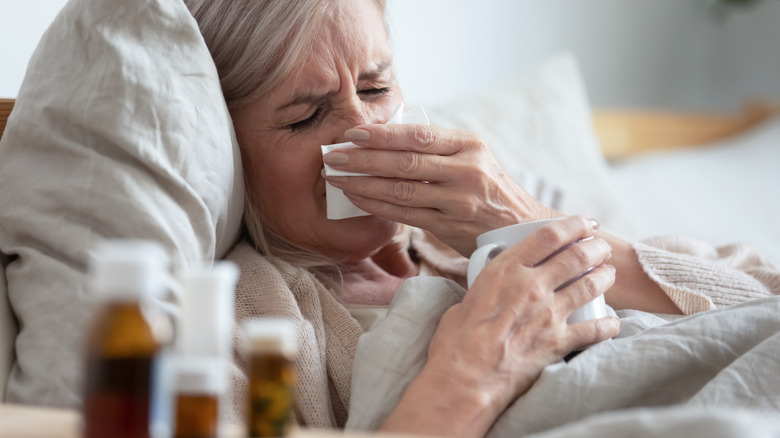Antihistamines Versus Decongestants: What's The Difference?
It's that time of year again. Allergy season has arrived. According to the American College of Allergy, Asthma, and Immunology, seasonal allergies tend to flourish beginning as early as February and ending in the late summer and fall.
For many people, the warmer weather of spring and summer means seeing family and friends, spending time outside, swimming in the pool, or simply enjoying the sunshine. For others, however, it means constant allergy symptoms, like sneezing, a runny nose, and red and watery eyes.
The most common causes of seasonal allergies are pollen from grass and ragweed and mold spores, according to Family Allergy. As you spend more time outside, you may become exposed to these various allergens.
While there is no cure for seasonal allergies, besides staying away from the allergens or undergoing allergy shot treatments, there are medications that can bring relief from your symptoms, specifically antihistamines and decongestants.
Antihistamines fight against histamines
The pollen released by plants during allergy season is usually harmless, says Healthline. However, sometimes your body considers it a threat and takes action to remove it, causing you to have an allergic reaction.
Histamines are chemicals created by your body in response to allergic reactions. They help your body remove the allergens by creating familiar symptoms — like watery eyes, itching, and sneezing — explains WebMD. Effectively, the symptoms you feel during allergy season are not caused by the allergens themselves but are your body's reactions fighting against them.
You may have taken an antihistamine before when you had allergy symptoms. As the name suggests, antihistamines fight against histamines. Antihistamines calm the body down and try to get rid of histamines, stopping the symptoms.
They come in many forms that might provide more relief for certain symptoms, according to WebMD. For example, nasal sprays help relieve symptoms related to the nose — including sneezing, congestion, and postnasal drip — whereas pills may target itching more.
Decongestants focus on relieving congestion
While antihistamines are general medicines that relieve a variety of allergy symptoms, decongestants focus exclusively on reversing congestion within the nose. Specifically, decongestants reduce the fluid within the nasal tissues, which relieves congestion and swelling, according to WebMD.
Like antihistamines, decongestants come in a variety of forms that provide choice to the patient, explains Verywell Health. These include pills, tablets, capsules, and liquids.
For maximum protection against allergy symptoms, some medications combine antihistamines and decongestants. Some even add pain relievers for a full spectrum of relief (via WebMD).
Dosage of decongestants will be different depending on your age and the form of medication taken. The best thing to do is follow the directions on the label. However, when it comes to nasal spray decongestants, less is more. Taking too much nasal spray can cause burning, stinging, dryness, and more mucus than before, according to Healthline.



